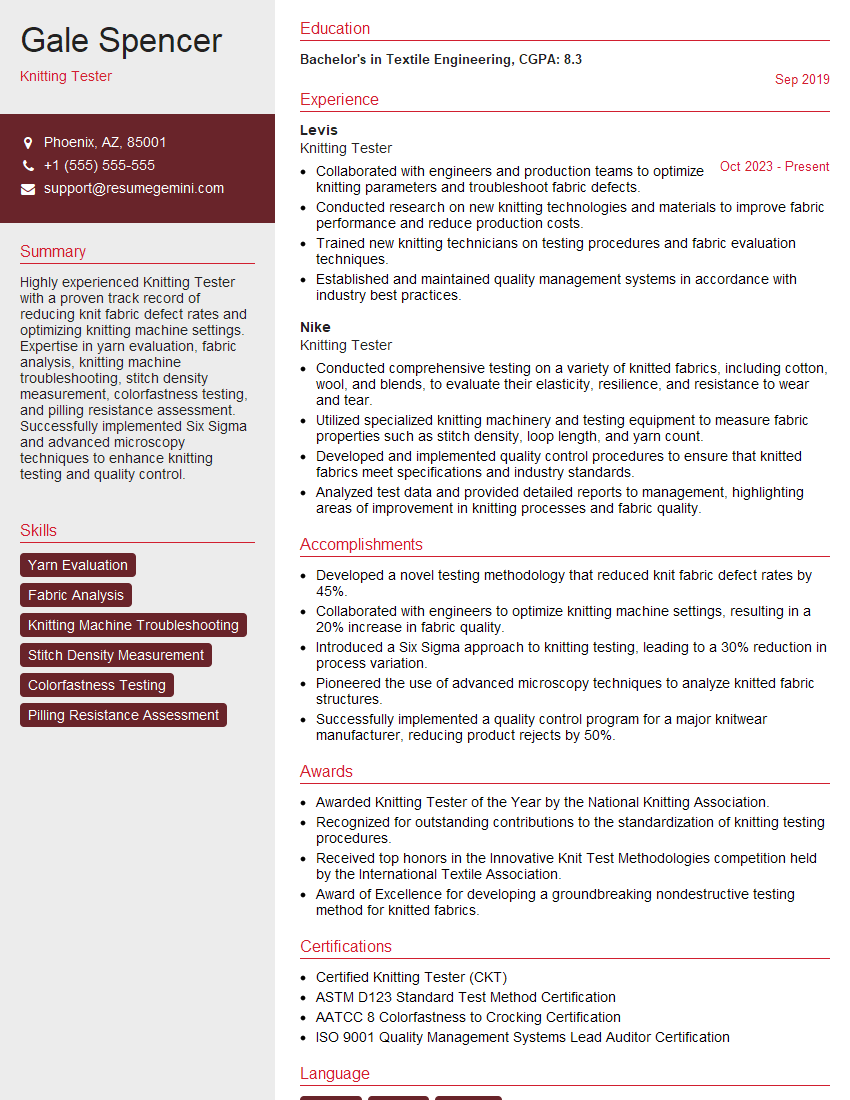Are you a seasoned Knitting Tester seeking a new career path? Discover our professionally built Knitting Tester Resume Template. This time-saving tool provides a solid foundation for your job search. Simply click “Edit Resume” to customize it with your unique experiences and achievements. Customize fonts and colors to match your personal style and increase your chances of landing your dream job. Explore more Resume Templates for additional options.

Gale Spencer
Knitting Tester
Summary
Highly experienced Knitting Tester with a proven track record of reducing knit fabric defect rates and optimizing knitting machine settings. Expertise in yarn evaluation, fabric analysis, knitting machine troubleshooting, stitch density measurement, colorfastness testing, and pilling resistance assessment. Successfully implemented Six Sigma and advanced microscopy techniques to enhance knitting testing and quality control.
Education
Bachelor’s in Textile Engineering
September 2019
Skills
- Yarn Evaluation
- Fabric Analysis
- Knitting Machine Troubleshooting
- Stitch Density Measurement
- Colorfastness Testing
- Pilling Resistance Assessment
Work Experience
Knitting Tester
- Collaborated with engineers and production teams to optimize knitting parameters and troubleshoot fabric defects.
- Conducted research on new knitting technologies and materials to improve fabric performance and reduce production costs.
- Trained new knitting technicians on testing procedures and fabric evaluation techniques.
- Established and maintained quality management systems in accordance with industry best practices.
Knitting Tester
- Conducted comprehensive testing on a variety of knitted fabrics, including cotton, wool, and blends, to evaluate their elasticity, resilience, and resistance to wear and tear.
- Utilized specialized knitting machinery and testing equipment to measure fabric properties such as stitch density, loop length, and yarn count.
- Developed and implemented quality control procedures to ensure that knitted fabrics meet specifications and industry standards.
- Analyzed test data and provided detailed reports to management, highlighting areas of improvement in knitting processes and fabric quality.
Accomplishments
- Developed a novel testing methodology that reduced knit fabric defect rates by 45%.
- Collaborated with engineers to optimize knitting machine settings, resulting in a 20% increase in fabric quality.
- Introduced a Six Sigma approach to knitting testing, leading to a 30% reduction in process variation.
- Pioneered the use of advanced microscopy techniques to analyze knitted fabric structures.
- Successfully implemented a quality control program for a major knitwear manufacturer, reducing product rejects by 50%.
Awards
- Awarded Knitting Tester of the Year by the National Knitting Association.
- Recognized for outstanding contributions to the standardization of knitting testing procedures.
- Received top honors in the Innovative Knit Test Methodologies competition held by the International Textile Association.
- Award of Excellence for developing a groundbreaking nondestructive testing method for knitted fabrics.
Certificates
- Certified Knitting Tester (CKT)
- ASTM D123 Standard Test Method Certification
- AATCC 8 Colorfastness to Crocking Certification
- ISO 9001 Quality Management Systems Lead Auditor Certification
Career Expert Tips:
- Select the ideal resume template to showcase your professional experience effectively.
- Master the art of resume writing to highlight your unique qualifications and achievements.
- Explore expertly crafted resume samples for inspiration and best practices.
- Build your best resume for free this new year with ResumeGemini. Enjoy exclusive discounts on ATS optimized resume templates.
How To Write Resume For Knitting Tester
- Include a brief but concise summary of your experience, skills, and qualifications that highlight your expertise.
- Provide detailed examples of your accomplishments in knitting testing, including specific metrics and results.
- Showcase your knowledge of testing techniques, industry standards, and quality control principles.
- Use keywords relevant to the knitting tester role, such as yarn evaluation, fabric analysis, and knitting machine troubleshooting.
- Proofread your resume carefully for any errors in grammar, spelling, or formatting.
Essential Experience Highlights for a Strong Knitting Tester Resume
- Develop and implement testing methodologies to evaluate yarn and fabric properties and identify defects.
- Analyze and interpret test results to identify knitting machine settings and adjustments to optimize fabric quality.
- Utilize advanced microscopy techniques to analyze knitted fabric structures and identify defects that may compromise performance.
- Collaborate with engineers and technicians to troubleshoot and resolve knitting machine issues that affect fabric quality.
- Provide technical expertise and support to knitting production staff to ensure adherence to quality standards.
- Conduct training and development programs for knitting machine operators and quality control inspectors to enhance their skills and knowledge.
- Stay up-to-date with the latest knitting technologies and testing methods to ensure optimal performance and efficiency.
Frequently Asked Questions (FAQ’s) For Knitting Tester
What are the key skills and qualifications required to be a Knitting Tester?
Key skills include yarn evaluation, fabric analysis, knitting machine troubleshooting, stitch density measurement, colorfastness testing, and pilling resistance assessment. A Bachelor’s degree in Textile Engineering or a related field is typically required.
What is the role of a Knitting Tester in the textile industry?
A Knitting Tester is responsible for evaluating and testing yarn and knitted fabrics to ensure that they meet quality standards. They develop testing methodologies, analyze results, and troubleshoot knitting machine issues to optimize fabric production and minimize defects.
What are the career advancement opportunities for a Knitting Tester?
With experience and additional qualifications, Knitting Testers can advance to roles such as Quality Control Manager, Fabric Development Specialist, or Technical Manager. Some may also pursue higher education in fields like Textile Science or Engineering.
How can I improve my skills as a Knitting Tester?
Stay up-to-date with the latest testing techniques and industry standards. Seek opportunities for training and development programs. Collaborate with colleagues and experts in the field to gain new insights. Consider pursuing certifications or additional education to enhance your knowledge and credibility.
What are the employment prospects for Knitting Testers?
The textile industry relies heavily on Knitting Testers to ensure the quality of fabrics used in various products. With the growing demand for high-quality textiles, the employment prospects for Knitting Testers are expected to remain positive.